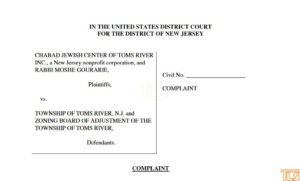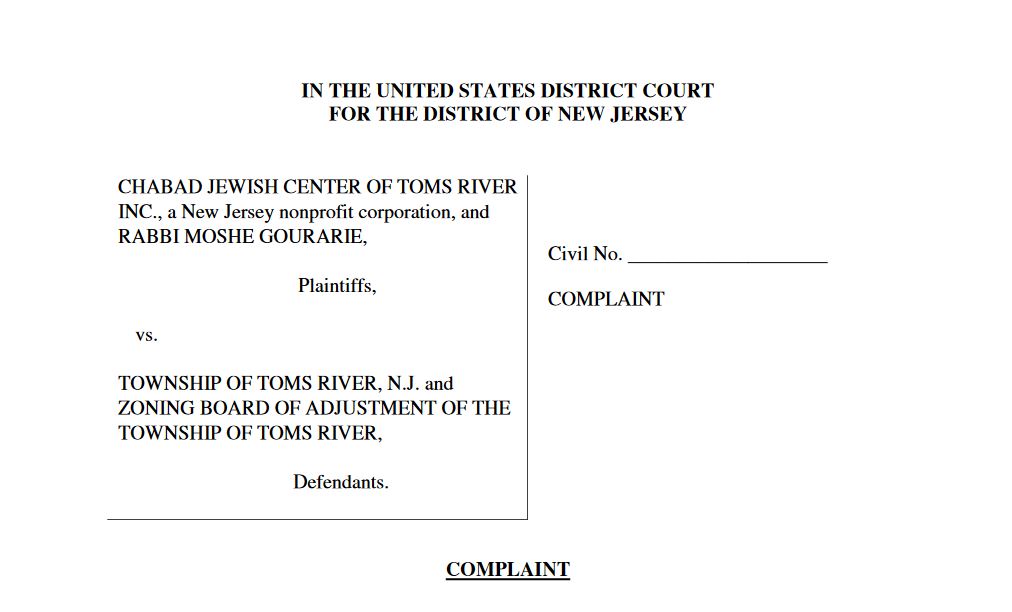 In a strong boost to religious liberty and intercommunal harmony, Judge Freda L. Wolfson of the U.S. District Court of New Jersey ruled that the Toms River municipality broke various laws, including the Religious Land Use and Institutionalized Persons Act of 2000 (RLUIPA), the Fair Housing Act and other anti-discrimination laws, its quest to ban Rabbi Moshe Gourarie from operating Chabad Jewish Center in his home on Church Road.
In a strong boost to religious liberty and intercommunal harmony, Judge Freda L. Wolfson of the U.S. District Court of New Jersey ruled that the Toms River municipality broke various laws, including the Religious Land Use and Institutionalized Persons Act of 2000 (RLUIPA), the Fair Housing Act and other anti-discrimination laws, its quest to ban Rabbi Moshe Gourarie from operating Chabad Jewish Center in his home on Church Road.
Toms River required Rabbi Gourarie to obtain a variance so that he can host minyanim and similar activities in his home, which is in a residential zone, and issued him a host of violations. Judge Wolfson affirmed that hosting religious services and events in the home – subject to limitations of attendees and quality of life protections for neighbors – is a constitutionally protected liberty even within a residential property. In addition, the Township was ordered to pay $122,500 in damages to Rabbi Gourarie.
The ruling is a strong setback for other municipalities as well who place onerous ordinances that inhibit peaceful, constitutionally protected activities, such as prayers, Eruv or schools, especially when they are clearly targeted to exclude Orthodox Jews or any other ethnicity from a municipality. This was particularly evident in the Chabad case, as a non-Jewish house of worship operated nearby for many years without any variance requirement. Hateful anti-Semitic comments made at public hearings and on social media against the Jewish Center were also a focal point in the case, proving unsavory motives in the municipality’s efforts.
Roman Storzer, Esq., represented Chabad in this case, and previously won friendly verdicts in similar cases in Ocean, NJ and Pomona, NY. Attorney Storzer also represents Agudath Israel and its co-plaintiffs in their lawsuit against Jackson Township’s discriminatory ordinances against shuls, Eruvs and nonpublic schools.
The reaction from community leaders in the region was swift.
“We are pleased that the federal court ruled in favor of religious freedom,and are glad to have this sad issue behind us,” said Rabbi Moshe Zev Weisberg of The Lakewood Vaad. “We reach out to our adversaries to please turn the page and try to resolve forthcoming issues in the spirit of good neighbors and reasonable accommodation.”
Mrs. Chanie Jacobowitz, Director of Government Affairs, Beth Medrash Govoha, stated, “We hope that today’s decision will send a message of the paramount societal importance of religious liberty and tolerance. We call on our neighbors and the municipal officials in towns throughout our region to join us in an effort to spread the message of tolerance and cooperation for the good of all.”
“Agudath Israel is overjoyed that the Chabad House can continue to serve its community,” said Rabbi Avi Schnall, Director of Agudath Israel of America’s New Jersey office. “We hope that this decision will serve as a reminder to all townships that religious liberties in the United States will not be trampled upon.”


Does this mean the Township will be more receptive to applications allowing yeshivos in areas that have been until now not allowed? They passed an ordinance several years ago requiring 10 acres for a school. I think that is discrimination as well. Hopefully a yeshiva will apply on less than 10 acres and challenge this discriminatory policy and win.
There are limits. 25 people max other then 6x a year(yomim tovim) when 49 people are allowed. And no parking on church street.
It may set a precedence to limit capacity of other synagogues
This is very good news, the law is fairly clear. You’re allowed to hold small, religous assemblies in ur private, residential house. Period. I also hope the inspectors in Jackson realize that a person can make a Minyan in his house, and its NOT a violation. Thanx Rebbitzen Wolfson for educating the proper authorities.
I wouldn’t call this a “setback” for the townships, its more like a lesson to the townships: what they’e doing is illegal, not what the people are doing inside their private residences. It is NOT illegal to have a religous assembly inside your house, it IS illegal to ticket ppl for it, tho. V’nahapoch Hu. I hope the Jackson inspectors get this memo as well.
wow….hopefully Jackson will pay head
This is a settelment.one can have a prayer group in a home.
If someone wants more then 30-35 people to gather for prayer in a home it would need a variance as toms river ordinance still does not allow a church in a residental area and requires 5-10 ackers. This alone still needs to be dealt with via the DOJ as we cant drive to commerical area on sabbath and holidays as we would have to desecrate the sabbath to attend a synagogue.
I think there is a diffrence in a settlement vs court order or Ruled in favor of one part vs the other. This was a settlment. It may have ramifications less favorable then we may think. Still a win for chabad. Ddan natzach…
the reason for a settlement. because they knew they are going to lose.
There are a few more law suits in the works already , hopefully some for bias inspections and inspectors
Wishing Moshe continued success in his holy work. Didan Notzach!
The article says clearly this was a RULING, which may set precedence at certain court levels.
It never once mentioned the word “settlement” (which would set no precedent at all).
Religious freedom is just another great example why the US is the best place to live. To that end the public needs to be better educated on the tax implications associated with hosting religious services in a home. Despite the media portrayal of an “us vs. them” mentality much of the sensitivity I’ve witnessed firsthand was less about religion and more about the loss of taxable income on an $800k+ residential property.
The question for many becomes, can this outcome be viewed as a single instance or do we (Jew or non Jew) have a right to utilize our residential homes to host religious services then cite the property as tax exempt? If so what are the qualifications?